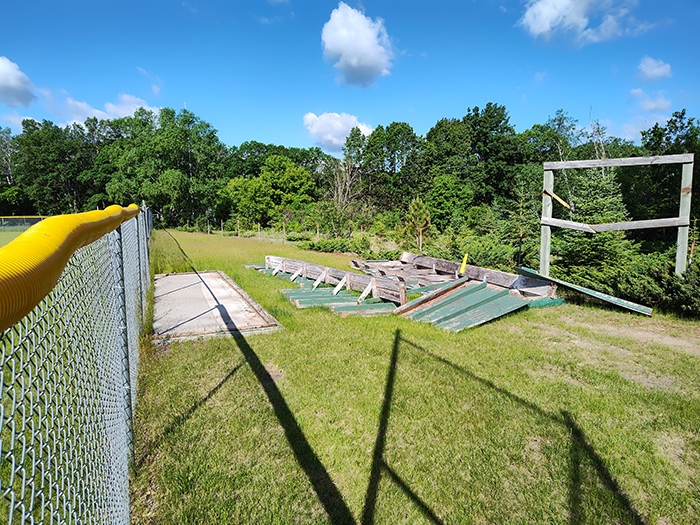City of Vergas hires new engineering firm
News | Published on June 24, 2022 at 12:41pm EDT | Author: Chad Koenen
0Ballpark damage gets retroactive coverage

By Robert Williams
Editor
The Vergas City Council approved up to $2,500 for the new city engineering firm to proceed with communications with the railroad company on a potential relocation of East Lake Street at the council’s monthly meeting on Tuesday, June 14.
The relocation is potentially more of a new right of way, given a lack of the current area not lining up properly with property owned by the railroad abutting the area.
Additional research is needed to clear up questions on property lines, including portions of Railway Avenue, which may be on railroad property.
“The chances of them (railroad) giving up the property or granting you an easement with a simple letter is not realistic,” city engineer Jeff Kuhn said.
“We’d just like to clean it up,” said councilman Bruce Albright.
Albright noted there are other parts of town with similar issues.
Kuhn is a civil engineer and vice president of Widseth Engineering Firm. Widseth was chosen by the city in a special council meeting Thursday, May 19. The city council conducted interviews with three firms including Ulteig and Moore and discussed the proposals of each firm before unanimously electing Widseth to complete engineering duties for the city.
Ballpark damage
covered by insurance
Damages caused to dugouts, scoreboard and property at the baseball field will be retroactively covered by insurance. At an earlier park committee meeting and subsequent city council meeting, it was announced that the dugouts were not insured.
According to parks committee chair Sherri Hanson, the committee worked with the League of Minnesota Cities to find a way to retroactively get the coverage and make an addition to the policy of coverage that was assumed to already be on the policy. The League carries the insurance and the claim will be covered when damage estimates are completed with a surcharge to the city for not having it insured. Bids are being collected to build two new dugouts.
Space needed for
diagonal parking
on 2nd Ave.
With diagonal parking already approved for 1st Avenue, the Event Center Advisory Committee discussed and approved a recommendation to the city council to move forward with diagonal parking on 2nd Avenue from Linden Street to Main Street in order to help alleviate the town’s parking problem.
The committee received a response from Kuhn after the meeting regarding the issue stating in order to change to diagonal parking, the curb would likely need to be moved. Diagonal parking uses 20-22 feet, plus that should allow for two through lanes of 20-24 feet.
To have parallel parking on the west side of Linden, with angled parking on the east, and two through lanes the space needed would be 51-54 feet. According to Kuhn, the city currently has only 44-45 feet.
Townline Road
easements doubled
The city has offered eligible residents on Townline Road double the original easement amounts, expecting a response from homeowners in 10 days in hopes of settling a negotiation that has continued since February.
Townline Road became a city road by default after years of public use and city maintenance, but an easement from property owners needs to be accepted so city crews can legally maintain the ditches and assess and remove other hazards that impede the right of way.
The city attorney and clerk/treasurer Julie Lammers met with four of the landowners in May regarding the proposed road easements.
Collectively, the landowners felt that the value set for agricultural land ($2,900/acre) was too low. This amounts to $0.0666/sq.ft.; the rate for homesteads is $0.45/sq.ft.
Other concerns were the coverage of any damage caused to an existing fence within the easement on one specific property and agreement verbiage is needed that the city will reimburse any repairs needed due to city equipment-caused damage.
The city does have the option of eminent domain, if necessary, but efforts are being made to avoid that.
Albright noted that would involve an attorney, parcel appraisals, and city staff time.
Short of going to court, Albright felt if the agricultural land values were doubled ($5,800/ac.), the city might get the easements signed voluntarily, which would still cost less than the eminent domain option.
If the city is forced to use eminent domain, all previous offers are removed from the table, and negotiations begin again with parcel appraisals.
Another concession that the landowners wanted was a guarantee that if the city ever decides to improve the road, the landowners will not be assessed—a request that is impossible.
Should the road ever be improved, the regular legal process would allow for that to be contested at that time.
The council approved the Streets-Sidewalks and Yard Waste Committee’s proposal to double the agricultural rate to $5,800/acre in an effort to settle the issue.
The responses from landowners and next moves will be discussed at the July council meeting.

